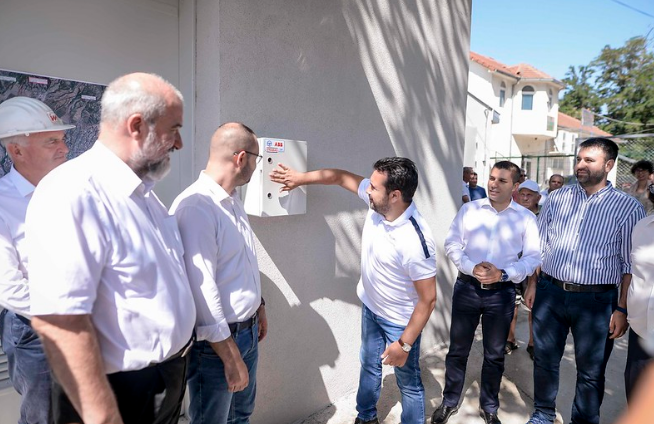The southern Vardar River valley irrigation project has successfully introduced a modern agricultural water supply system based on rational management of water resources, said Prime Minister Zoran Zaev at an event marking the completion of the second stage of construction on the system watering a total area of 2,150 hectares in the Municipality of Valandovo, including the villages of Udovo, Josifovo, Kalkovo and Pirava.
According to an official press release, also attending the event were Deputy Prime Minister for Fighting against Corruption and Crime, Sustainable Development and Human Resources Ljupcho Nikolovski; Minister of Agriculture, Forestry and Water Economy Arianit Hoxha; Minister of Health Venko Filipce; Valandovo Mayor Pero Kostadinov; and German chargé d’affaires Otto Graf.
PM Zaev said that such investments would improve agriculture, bringing better working and living conditions to people in the Valandovo region.
“Modern, competitive, export-oriented agriculture is one of our priorities,” Zaev said.
He added that the Ministry of Agriculture, Forestry and Water Economy as well as the Agency for Financial Support of Agriculture and Rural Development have been reaching out to farmers to offer them funding and technical support.
“We are strongly supporting agriculture, which is why it is important to apply to all calls and programs of the Government providing opportunities to modernize agricultural production.”
“Our common goal is to better develop Macedonian agriculture and rural regions, which will boost the economy in general,” Zaev noted, congratulating everyone who worked on the irrigation project.
Deputy PM Nikolovski said the project, worth over 24 million euros, was extremely important for developing the Valandovo–Gevgelija region.
Minister of Agriculture Hoxha said the Water Management and Irrigation Infrastructure Investment Plan budget would cover rehabilitating and modernizing existing irrigation systems and the repair of small dams and reservoirs.
Valandovo Mayor Kostadinov said the new water supply system had paved the road to a clean and healthy environment through a better developed agriculture.
German chargé d’affaires Otto Graf expressed satisfaction with the transformation of an outdated open canal into a modern and fully automated system for the more efficient use of water and energy.
The project was funded in part by the Ministry of Agriculture, Forestry and Water Economy. The remaining 70 percent was financed by a grant and a favorable loan agreement with the Government of the Federal Republic of Germany, represented by the German Development Bank.




Comments are closed for this post.